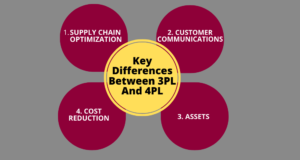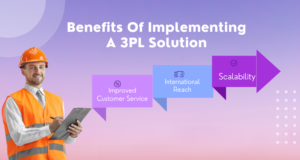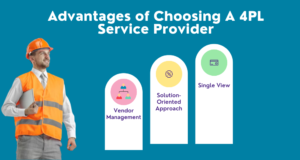Are you new to logistics or having difficulties comprehending the distinctions between 4PL and 3PL logistics? If so, then you have arrived at the appropriate place.
In this blog post, we will provide an extensive guide explaining what these two terms indicate, how they differ, and why businesses must be familiar with them.
Understanding The Basics
Logistics is a fundamental aspect of the supply chain process, and having an effective logistics system in place can be decisive for businesses in terms of the successful delivery of goods and services.
Regarding logistics, two different types of logistics providers assist companies with managing their supply chain procedures: 3PL (Third-Party Logistics) and 4PL (Fourth-Party Logistics).
What Is 3PL?
3PL stands for ‘third-party logistics’ and involves engaging the services of an external organization to manage every aspect associated with relocating stock from one point to another.
A 3PL company can offer such services as packaging, sorting out consignments, warehouse storage facilities, transportation, and delivery on behalf of their clients. If a business wishes to outsource its warehousing requirements, it could enlist the services of a 3PL provider who can manage everything from procuring warehouse leases to stocking up inventory.
What Is 4PL?
4PL providers are fourth-party organizations that work as a go-between for multiple stakeholders associated with a supply chain system by furnishing end-to-end solutions linked to transport management.
Such organizations usually provide integrated services through various channels, including land transportation, air freight forwarding.
3PL Versus 4PL
The main contrast between 3PLs and 4PLs is that 3PL providers furnish particular services associated with specific fields, such as warehousing or transportation.
4PL practitioners provide more all-encompassing end-to-end solutions for several areas over various logistics operations. It could range from sourcing materials/products, storage & distribution, deliveries & returns, etc.
Besides, 4PL takes charge of the whole cycle of products from supplier to the buyer by assuming responsibility for an entire section or area inside the overall process.
Key Differences Between 3PL And 4PL
Now you know the basics. Let’s look at the Key difference between 3PL and 4PL.
1. Supply Chain optimization
Third-Party Logistics Providers (3PLs) offer comprehensive transportation management and warehousing services, including order fulfillment, inventory control, shipping, and customs clearance. Meanwhile, 4PL specializes in overall supply chain optimization strategies.
A 4PL will assess existing processes and produce tailor-made solutions to reduce cost while heightening efficiency across the whole operation. This could include outsourcing specific procedure components into a single streamlined system.
2. Customer communications
When dealing with a 3PL provider, customers generally have to deal with one point of contact for all their requirements. However, when engaging the services of a 4PL provider, they will likely come into contact with multiple individuals who possess expertise in areas that include customer service or warehouse operations.
This means that customers can benefit from receiving more bespoke attention from each individual rather than just one person managing everything.
Assets
Many companies that use 3PL services possess their fleets or warehouses, which they employ solely to fulfill customer orders.
However, a 4PL provider generally does not have any physical assets to its name but instead subcontracts resources from various vendors depending on customer requirements or budget limits. This can lead to considerable savings over time and an increased supply when dealing with unforeseen alterations in customer demand patterns or market conditions.
Regarding cost reduction, there are notable differences between 3PL and 4Pl. 3PL providers charge per shipment, whereas 4Pl companies often provide bundled pricing options wherein multiple shipments can be discounted depending on volume/size/weight etc.
Thus leading to substantial savings compared to customary approaches employed by many 3PL firms.
Order Fulfillment
When it comes to order fulfillment, the complexity is heightened. Third parties typically manage orders from the start (picking/packing) until they reach their destination (delivery).
Fourth parties add value by assuming control of all stages within the order fulfillment cycle. This includes order management (processing and invoicing), inventory management and replenishment, etc.
This makes it possible for businesses to access extra resources when demand unexpectedly increases without having had occasion to take on additional personnel themselves.
Benefits Of Implementing A 3PL Solution
Take a look at the benefits of 3PL:
1. International Reach
The most significant benefit of a 3PL solution is its international reach. In the modern globalized economy, companies must be able to compete on a global level for them to succeed. A 3PL provider can enable businesses to quickly and easily expand into new markets by exploiting their existing logistics infrastructure.
By connecting with a 3PL provider with established experience within the target country, firms can access resources and capabilities that would otherwise be unavailable for smaller organizations.
2. Improved Customer Service
As consumer demands rise inevitably, organizations must have the capacity to deliver superior services quickly and proficiently in order for them to remain competitive within the marketplace.
A respectable 3PL provider will possess an already established infrastructure that allows them to meet customer requirements more effectively than what could be attained through internal operations alone.
This encompasses advanced tracking capabilities, which allow customers to keep track of their orders in real time, along with shorter delivery times due to existing collaborations with freight carriers across multiple nations or regions.
3. Scalability
Scalability is another significant benefit of employing a third-party logistics solution in your business activities. A dependable third-party partner will be able to swiftly adjust systems and resources as required so that your enterprise can avoid any openings caused by logistical problems or blockages.
This also assists in economizing costs by making sure you do not pay for more than necessary at any point while still positioning yourself adequately for unexpected increases in demand.
Advantages of Choosing A 4PL Service Provider
Take a look at the following:
1. Vendor Management
In addition to the core services, a 4 PL Provider can provide value-added activities such as Vendor Management and a solution-oriented approach for their customers.
One of the significant advantages of using 4 PL over Third Party Logistics Providers (3PLs) is that they can manage multiple vendors across different stages within the Supply Chain Process to ensure on-time delivery while staying within budget.
2. Solution-Oriented Approach
4PL companies offer a problem-solving approach that allows them to take an integrated strategy when facing customer challenges.
Rather than trusting in individual processes from each vendor engaged in the transaction process, which may lead to delays or expensive errors if not managed suitably.
3. Single View
Providing a single view of all vendors involved makes it much simpler to monitor progress, adapt strategies if required, and ensure that all vendors abide by industry regulations so there are no obstructions or other issues throughout transit or storage timeframes.
Furthermore, single-view access gives customers insight into their supply chain operations, giving them excellent command over expenses. Also, performance metrics are connected with each vendor/service used across the entire system. Thus, resulting in improved productivity overall.
Conclusion
When selecting 3PL and 4PL, deciding which is the ideal fit for a business may be challenging. Consider numerous aspects, including expense, service level commitments, and scalability, when making this decision. 3PL (Third-Party Logistics) providers give shippers access to various freight transportation and warehousing services. 4PL companies concentrate more on consulting services like supply chain strategy development, outsourcing management, and inventory optimization. So, it depends on companies’ needs and demands and what kind of logistic provider they seek.










